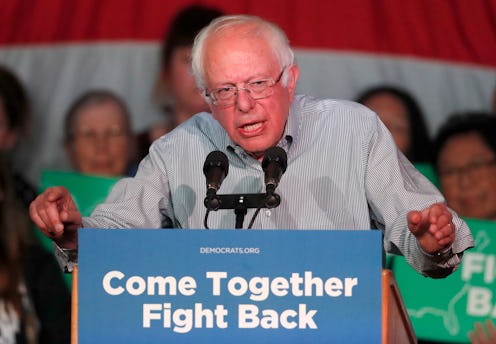News
Bernie Sanders Urges The Democratic Party To Embrace Change

For all his talk of unity, Sen. Bernie Sanders, an independent from Vermont, is still not making nice with the Democrats. Despite going on a "Come Together, Fight Back" tour with the chairman of the Democratic National Committee Tom Perez, Sanders is keeping the party at an arm's distance — specifically by pointing out last week that he is not, in fact, a Democrat. But that's not the last of it. On Sunday morning's Face The Nation on CBS, Sanders criticized the Democratic party, adding that grassroots activism is the only way back to electoral success in the country.
He was interviewed by host John Dickerson about his take on the party and the ways that it can be brought back to electoral success. Sanders did not mince words and said that it's "clear to anyone who looks" at where the Democrats are today "that the model of the Democratic party is failing."
He went on to point out that Republican President Donald Trump, "ran as a candidate as the most unpopular candidate in modern history of this country" — and yet he won. And to be fair, it doesn't stop there. Sanders added, "Republicans control the House, the Senate, two-thirds of governor's chairs. And in the last eight years, they have picked up 900 legislative seats."
That doesn't sound good. But Sanders did also offer a plan to fix the party that he doesn't identify with:
Clearly, the Democratic Party has got to change. And, in my view, what it has got to become is a grassroots party, a party which makes decisions from the bottom on up, a party which is more dependent on small donations than large donations, a party, John, that speaks to the pain of the working class in this country.
Sanders repeated some of the main arguments he made during the Democratic presidential primary and spoke about the shrinking middle class, and how "wealth is going to the top 1 percent." He touched on health care, child care, and other economic issues. Then he continued:
The Democratic Party has got to take the lead, rally people, young people, working people, stand up to the billionaire class. And when we do that, you're going to see voter turnout swell. You're going to see people coming in and running for office. You're going to see Democrats regain control of the United States Congress.
But how exactly the party forms itself from the grassroots is part of a sticking point between Sanders and some other Democrats. For instance, Sanders refused to label Jon Ossoff a progressive when speaking with The Wall Street Journal last week. Later, he endorsed Ossoff, but then said, "If you run as a Democrat, you're a Democrat. ... Some Democrats are progressive and some Democrats are not."
Meanwhile, he has no problem endorsing a Nebraska Democrat who is opposed to abortion rights. Speaking to this on Sunday, Sanders explained to Dickerson that an anti-abortion Democrat is better than a Republican against abortion rights in a place like "Omaha, Nebraska, which has a Republican governor, two Republican senators, all Republican congresspeople, Republican legislature."
Sanders sees motivating Democrats in places like Nebraska as key. He wants the red states in play and voter turnout to surge — especially after the last midterms in 2014. "Almost two out of three Americans didn't vote, and Republicans did very, very well. If that continues, there is no future forward for the Democratic Party," Sanders said.
But for Democrats' turnout to surge, more party unity — and among the left in general — will be key.